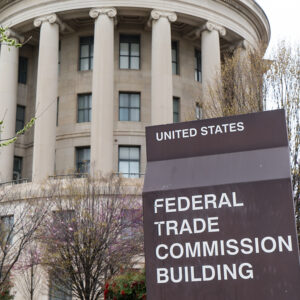When the Justice Department recently announced its lawsuit against Visa over allegedly monopolizing the debit payment market, it was a case that — right or wrong — the typical consumer could understand. Higher card fees forced on businesses by lack of competition might lead to higher prices for shoppers.
However, Federal Trade Commission chair Lina Khan’s targeting of Amazon and other large online businesses, on the other hand, is more challenging to understand. Amazon is widely agreed to have driven prices down. Google’s services are free. How can a consumer get a lower cost than that?
If the goal of antitrust enforcement isn’t to help consumers, what is it?
That was the topic of a recent roundtable on antitrust policy hosted by InsideSources and the American Consumer Institute. At issue: The Biden administration’s operating theory is that bigger is always worse — even when the consumer wins.
“Until the current administration, there had been a bipartisan consensus that consumer welfare was a key standard of antitrust enforcement,” said former FTC general counsel Alden Abbott, one of the roundtable panelists.
Abbot said that U.S. competition law has been guided by the consumer welfare standard for decades, evaluating mergers, acquisitions and business practices based on whether they raise prices or diminish quality for consumers.
Khan and the administration are using a different approach, sometimes called the “Neo-Brandeis movement” after former Supreme Court Justice Louis Brandeis. It views all consolidation as problematic and potentially harmful, regardless of the outcome for consumers.

Tirzah Duren addresses the InsideSources/ACI roundtable at the National Press Club on September 18, 2024.
“The Neo-Brandeisian model is to take a very holistic approach to antitrust,” said American Consumer Institute’s Tirzah Duren, who participated in the panel. When looking at a corporate merger, they look beyond the effect on consumers and include “their ideal society, their ideal economy, and also their ideal political systems.”
Ironically, Abbott noted, “President Biden himself in 2021 said the purpose of antitrust is to ‘promote the best allocation of our economic resources, the lowest prices, the highest quality and the greatest material progress.’
“But what has happened now is a radical change in the approach to antitrust,” Abbott said.
The timing for this shift is problematic, said Neil Chilson, the head of policy at the Abundance Institute and an expert on tech companies. With artificial intelligence exploding, these companies need flexibility to grow, not more bureaucratic hurdles to consolidation. With so many startups in the AI field, consolidation is inevitable and essential to America’s tech competitiveness.
Unfortunately, the administration isn’t on board.
When it comes to antitrust regulation of the tech sector, Chilson told the panel, “You have to take into account the seen and unseen effect that you’re (having) on innovation. One of the big challenges is that once a regulatory regime is put into place, it can be hard to see what we’re missing.
“And that’s why I think an effects-driven approach to solving problems is really important.”
While America’s businesses in the most competitive sectors, like tech and retail sales, are scrambling for a competitive edge, Abbott said, the Biden administration wants to prioritize other issues, like promoting social justice and discouraging consolidation.
This isn’t a new theory, Abbott noted.
“In 2016, the final year of the Obama administration, Attorney General Loretta Lynch said, ‘Well, we’re going to have to start looking at economic justice, not just consumer welfare and antitrust.’”
Duren, of the American Consumer Institute, rejected the argument from Khan and her allies that the government needed the flexibility to reach beyond the consumer welfare standard to address the complexity of the modern economy.
“I would actually argue that the inverse is true because you have something (consumer welfare standard) that’s focused on a very specific harm,” Duren said. “And because you have something that’s really rooted in economic analysis, as markets change and as economic knowledge grows and we have better research, we can actually apply these very specific laws and new and innovative ways, moving forward.”
On the other hand, the Khan approach of expansive enforcement “would mean forgoing consumer benefits and societal progress. What proponents of neo-Brandeisian antitrust should be slow to forget is the reason for the (consumer welfare standard) in the first place.”
Abbott said the U.S. economy is already being affected.
“I talked to people involved in merger practice, and antitrust practice, and they say there’s a lot of uncertainty right now,” Abbott said. “There are a lot of deals that would have improved efficiency and innovation in the American economy. But they’re getting dropped.”
To see the downsides of this new approach, Abbott said, just look to Europe.
“Europe is often praised by antitrust enforcers, but Europe has not produced any great innovative platforms,” Abbott said. “Their economic growth and per capita GDP have slipped. The idea of a more centrally controlled antitrust that focuses on risk and prohibition makes no economic sense.”





